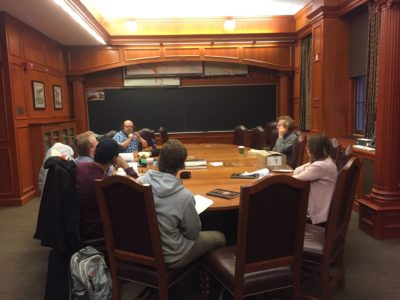At the turn of the twentieth century, most school children learned that Thucydides had earned the reputation as one of the greatest historians ever known. Higher education at that time consisted of reading great books under directed instruction cover to cover.
At a recent event at The Alexander Hamilton Institute for the Study of Western Civilization, alumni of Hamilton College, unfamiliar with the history of AHI, asked AHI Executive Director Robert Paquette, “What is it that you [i.e. AHI] do.” After pointing interlocutors to AHI’s widely praised charter, Paquette referenced, among other things, AHI’s sponsorship at multiple institutions of reading clusters during which undergraduates, sometimes joined by informed citizens in the region, read intensively and completely under the direction of a professorial authority works by the best and brightest in the Western canon.
During the academic year 2017-2018, AHI sponsored reading clusters at Hamilton College, Colgate University, and Loyola University Maryland. “Given declining standards and the operation of the open curriculum, a very destructive fashion that seems to be infecting way too many allegedly elite institutions,” Paquette observed, “I dare say that most students will graduate without having read in its entirety one of the volumes that University of Chicago President Robert Maynard Hutchins included in his celebrated fifty-four volume Great Books of the Western World (1952). And I make no exception for the United States Constitution, which is included in the set.”
At Colgate University, Dr. Elizabeth L’Arrivee, a specialist in Hellenistic political thought as well as a Great Books enthusiast, has rolled up her sleeves to address the problem. During the academic year, she led a reading cluster on Thucydides’ History of the Peloponnesian War. The year started off in September at Colgate with a Leadership Dinner featuring AHI Senior Fellow Mary Nichols, Professor of Political Science at Baylor University. Dr. Nichols subsequently delivered at Colgate a public lecture, “Leaders and Leadership in Thucydides’ History.”
Dr. L’Arrivee’s reading cluster met for extended conversations on Thucydides eighteen times over the course of two semesters. More than a dozen Colgate students participated, and they were joined by AHI fellows, members of the community and faculty from Colgate. Fred Chernoff, Harvey Picker Professor of International Relations, frequently lent his expertise in international relations, strategic studies, and national security, and Nicholas Rostow, Charles Evans Hughes Visiting Chair of Government and Jurisprudence, brought his considerable experience in politics to the table. The variety of perspectives of students and other participants— political philosophy, international relations theory, classics, politics, and history—made for rich, stimulating discussions of this most challenging text.
Thucydides’ History of the Peloponnesian War is widely regarded as the first work of scientific history and the foundation of modern day political realism. Since Thucydides is making headlines even today (a google search for Thucydides + news turns up more than 13000 hits), AHI had even more than the usual reasons for centering a cluster on this historical classic. Not only was Thucydides quoted in the blockbuster hit, Wonder Woman, but History of the Peloponnesian War became required reading for the inner circle led by Steve Bannon during the early months of the Donald Trump White House.
Participants in the Colgate reading cluster continually compared Thucydides’ historical and political insights to contemporary issues. Discussions ranged from overarching considerations of justice v. expedience and the conflict between oligarchy and democracy to the nitty gritty details of trireme warfare and hand-to-hand combat. Students particularly enjoyed conversations in the beautiful Classics lounge in Colgate’s Lawrence Hall. Its Loeb library (we did check the Greek at times!) and ancient Greek and Roman memorabilia proved to be a most fitting place to discuss Thucydides.
A recurring theme that emerged over the course of our discussions was Thucydides’ oscillation between an evident concern for justice and his apparent political realism. Dr. James R. Muir, a professor of philosophy at the University of Winnipeg, attended the final meeting and suggested that Thucydides is neither a realist, nor an idealist in the sense of viewing politics purely with respect to the just. Rather, Dr. Muir proposed that Thucydides perceives a permanent conflict between states who value justice and states who value expediency, in that expedient states will push just states to violate their own principles in the effort to obtain victory.
This tragic view of great power politics helps explain the increasingly astonishing behavior of Sparta and Athens, but also Alcibiades, who embodied the contradiction between the just and the expedient within himself by turning on his countrymen and allies when it proved expedient, while maintaining his principled view that it would be just for him to be leader of the Athenian people. In other words, Alcibiades’s actions cannot be explained in terms of pure self-preservation (expediency) – since he never absented himself from the conflict but worked continually to reposition himself in Athens. One of Thucydides’ great contributions to political philosophy is his insight that since politics is constituted by this fundamental, tragic conflict between the just and the expedient, our grand political designs should be moderate, yet sufficient to defend against the kinds of regimes (and leaders) who are willing to conquer at the expense of what is right or just.
To celebrate and commemorate the achievement of students who participated in this group, Dr. L’Arrivee and the students collaborated in designing a t-shirt, which were worn with great delight around campus in the final days of the semester. Students were also given a copy of Dr. Nichols’ book, Thucydides and the Pursuit of Freedom (Ithaca: Cornell, 2015) as a gift from the AHI at the end of the reading group. Participants thanked AHI and the Center for Freedom and Western Civilization for its support, the leadership dinner, and Dr. Nichols’ talk, and for providing, free-of-charge copies of Dr. Nichols’ book and the Landmark Thucydides edition of The History of the Peloponnesian War.

Leave A Comment